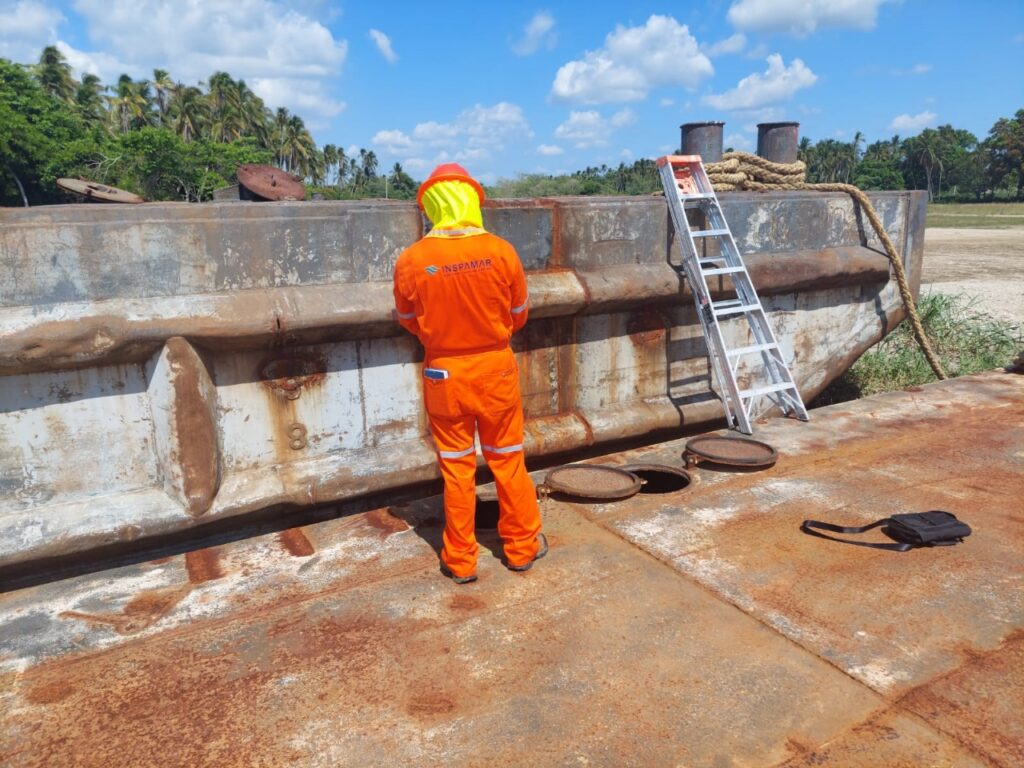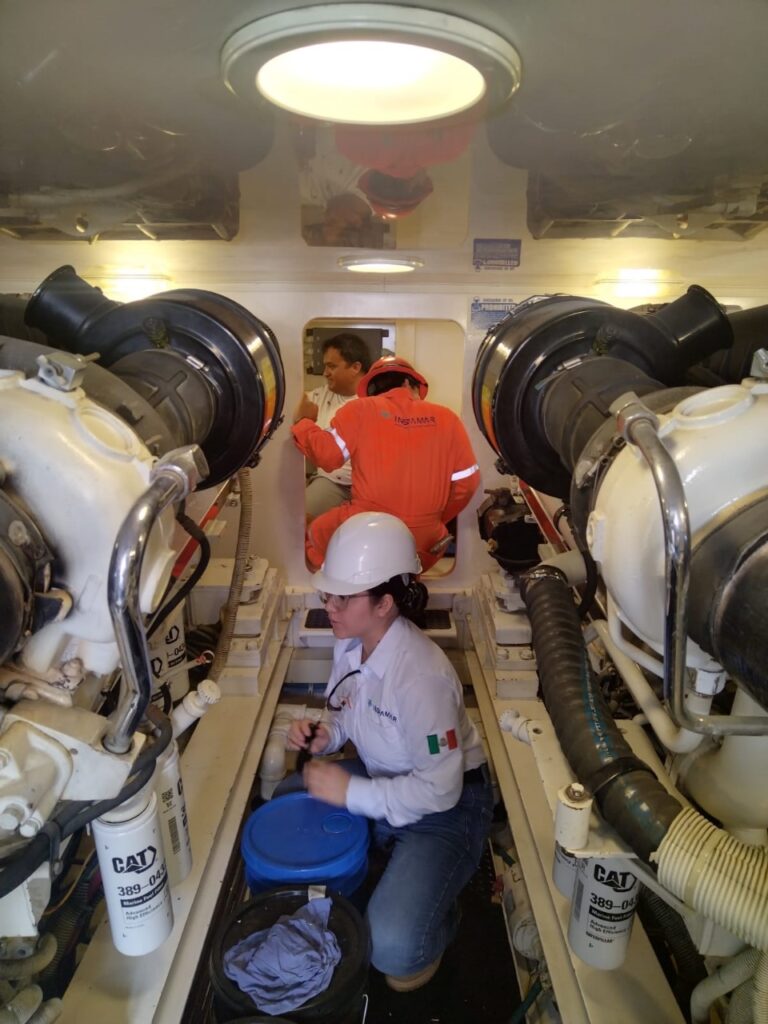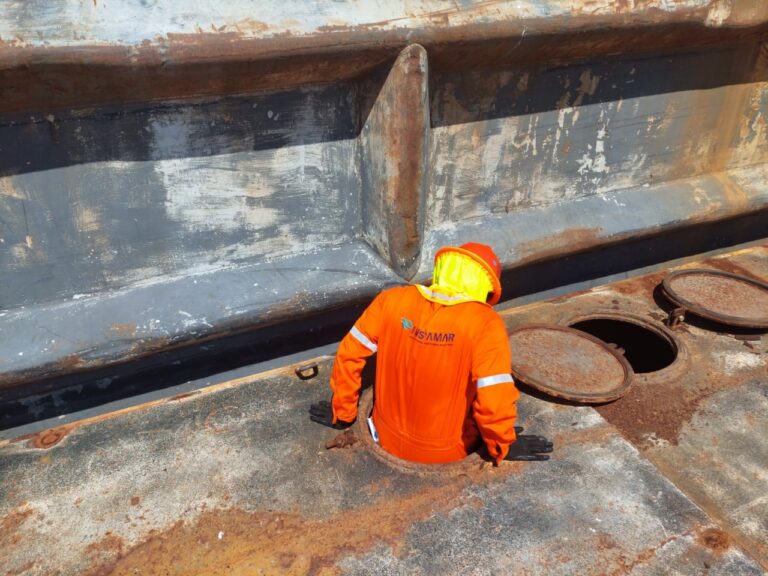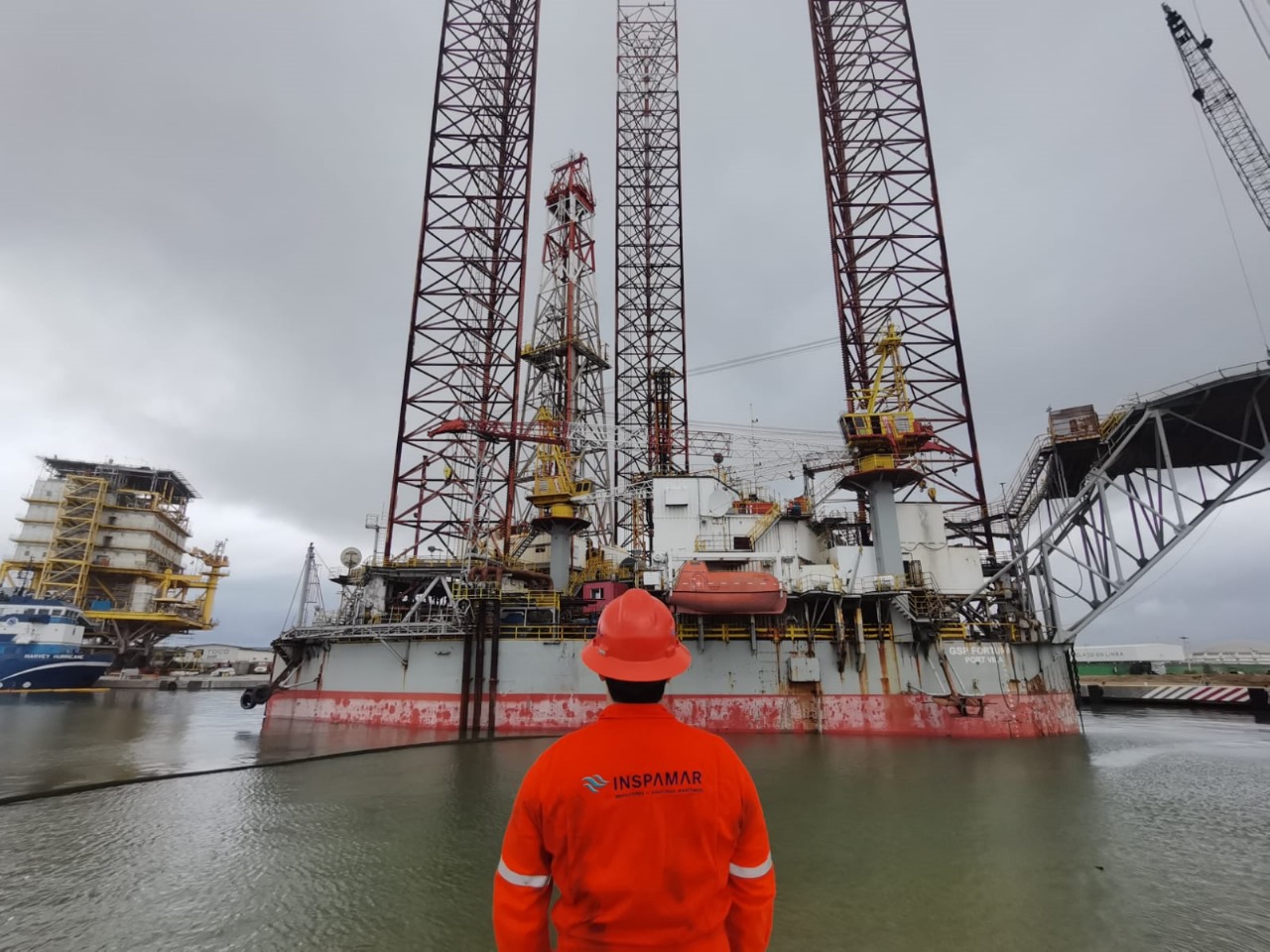
NOM (Official Mexican Standards)
Legal and Port Framework in Mexico
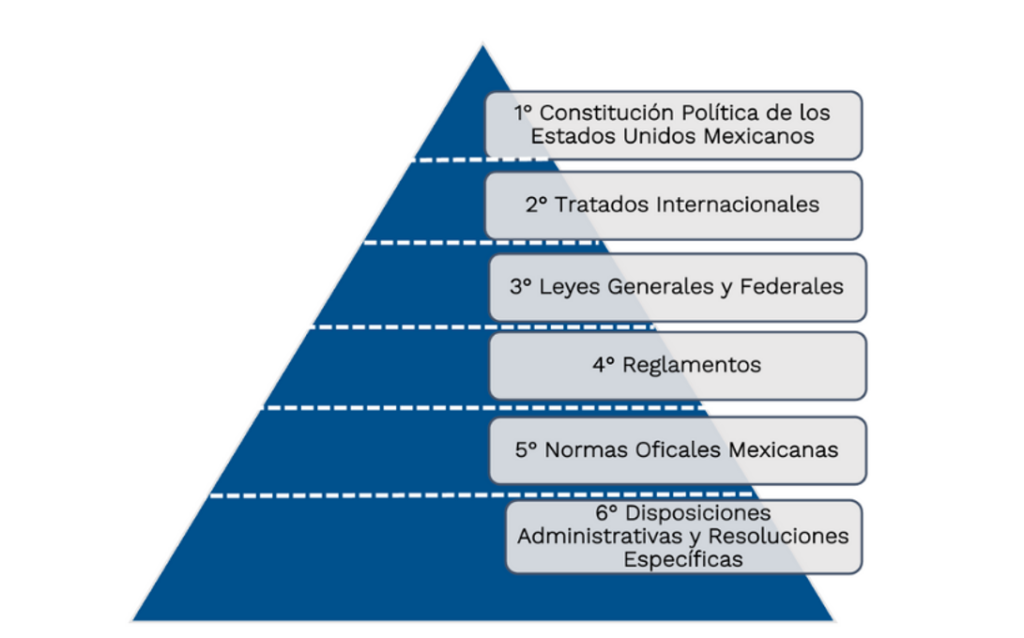
In Mexico, the maritime and port legal framework is structured into levels that ensure the harmony and coherence of legal provisions. Each level fulfills a specific function:
The Political Constitution is the supreme law that establishes the foundation for the development of Mexican maritime legislation.
Some international treaties ratified by Mexico include: the International Convention for the Safety of Life at Sea 1974 (SOLAS 1974); the International Convention for the Prevention of Pollution from Ships MARPOL 1973/1978; the Convention on Standards of Training, Certification, and Watchkeeping for Seafarers 1978 (STCW); the International Convention on Load Lines 1966; the International Convention on the Tonnage Measurement of Ships 1969, among others.
Laws are issued by the Congress of the Union and are applicable in
the entire national territory. Some of the most relevant ones include: the Navigation and Maritime Commerce Law; the Ports Law; the Federal Maritime Law, etc.
Regulations are a set of rules issued to facilitate the implementation of laws. Among the most relevant are those corresponding to the laws mentioned in item 3.
The Mexican Official Standards (NOM) are mandatory technical regulations issued by government agencies.
They are normative acts and decisions published by administrative authorities such as the Secretariat of the Navy (SEMAR), the Port Captaincies and Maritime Affairs Unit (UNICAPAM), and the General Coordination of Ports and Merchant Marine (CGPMM).
Legitimate public interest objectives of the NOMs include:
The Mexican Official Standards are developed with the aim of preserving a legitimate objective for the country, particularly for: individuals, animal or plant life, health, and environmental conservation, among others.
Previously, these objectives were regulated under the Federal Law on Metrology and Standardization of Mexico, but it was repealed on July 1, 2020, by the Law on Quality Infrastructure.
According to Chapter IV, Article 10 of the aforementioned current law, the NOMs aim to:
The purpose is to address the causes of problems identified by the Standardizing Authorities that affect or pose a risk to the legitimate public interest objectives.
I. The protection and promotion of health;
II. The protection of physical integrity, health, and life of workers in the workplace;
III. The protection of organic production, genetically modified organisms, health and safety in food, aquaculture, fishing, and animal industries;
vegetable;
IV. Food safety;
V. Education and culture;
VI. Tourist services;
VII. National security;
VI. Environmental protection and climate change;
IX. The use and exploitation of natural resources;
X. The healthy rural and urban development;
XI. Public works and services;
XI. Road safety;
XII. The protection of the right to information;
XIV. The protection of designations of origin;
XV. And any other public need, in accordance with the applicable legal provisions.
What are the NOMs?
The Mexican Official Standards (NOMs) are technical regulations issued by the competent authorities in Mexico. They establish specifications, guidelines, and procedures that must be followed in various products, services, or activities to ensure quality, safety, and efficiency, thereby protecting human, animal, and plant health, the environment, and the interests of consumers.
These standards are mandatory and cover a wide range of sectors, including health, environment, industry, and commerce. Their main objective is to ensure that products and services in the country meet minimum quality and safety standards, promoting competitiveness and protecting end users.
The NOMs are identified as follows:
The NOMs are developed by the National Standardization Advisory Committees (CCNN), which are collegiate bodies composed of representatives from all interested sectors. They are published in the Official Journal of the Federation (DOF) for consultation and entry into force.
The CCNN responsible for the NOMs in maritime and port matters is the Secretariat of the Navy (SEMAR) through the Port Captaincies and Maritime Affairs Unit. This is due to the powers granted to the Secretariat of the Navy (SEMAR) as the National Maritime Authority (AMN) on June 17, 2017.
The NOMs contain various points that structure the regulations, requirements, and guidelines that must be followed mandatory.
Main points included in a NOM:
I. CODE AND OBJECTIVE
II. SCOPE OF APPLICATION
III. SPECIFICATIONS AND CHARACTERISTICS IV. TEST METHODS
V. COMMERCIAL INFORMATION
VI. BIBLIOGRAPHY
VII. CONFORMITY ASSESSMENT
VIII. MONITORING
IX. PROCEDURES FOR CONFORMITY ASSESSMENT
Maritime and port security:
They implement measures, regulations, and actions to ensure the safety of people, assets, and operations.
Maritime and port protection:
Their purpose is to prevent and mitigate unlawful acts or threats.
Prevention of marine environmental pollution:
They aim to regulate environmental protection to prevent maritime activities from damaging marine ecosystems.
Maritime transport and ports:
It is essential for international trade, national security, and sustainable development.
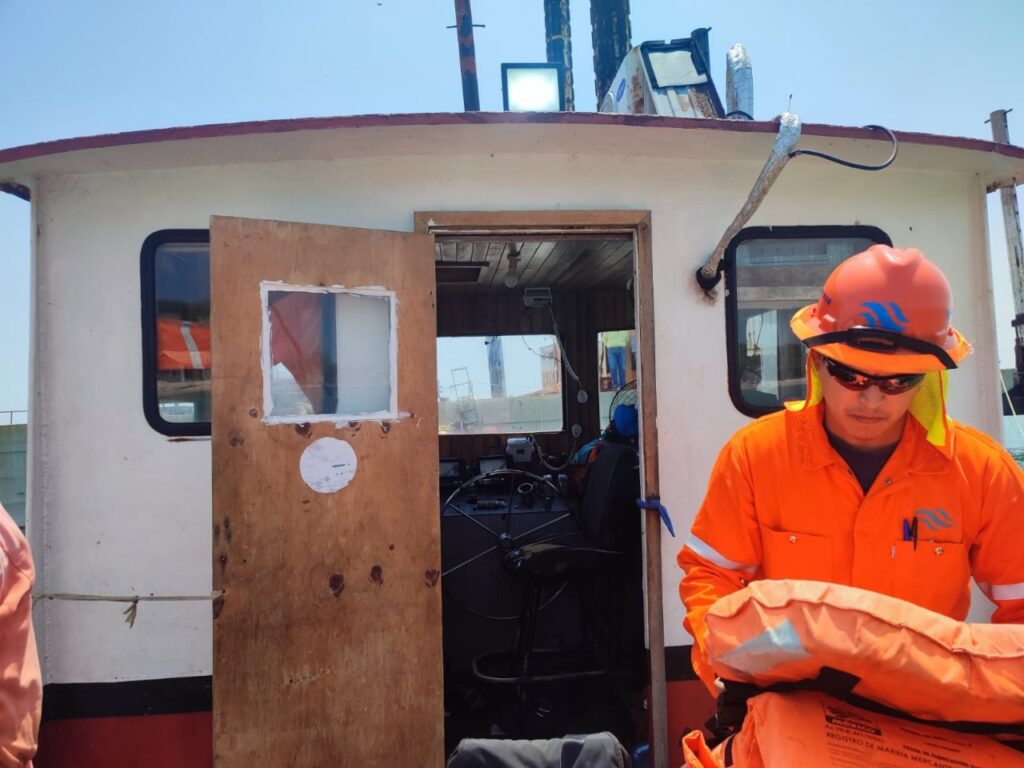
Standards applied in the maritime industry:
EJEMPLOS DE NOM’S APLICADAS:
The Mexican Official Standards (NOMs) play a fundamental role in the Mexican maritime industry to ensure safety, the protection of the marine environment, efficiency in port operations, and the
regulation of activities in national waters. On July 16, 2022, through the Official Journal of the Federation (DOF), the list of NOMs applicable to the national maritime industry that remain in force was published.
STANDARDS THAT CHANGED NOMENCLATURE AND REMAIN IN FORCE:
NOM-005-SEMAR-2006, Technical specifications that must be met by the
lifebuoys.
NOM-006-SEMAR-2015, Technical specifications that must be met by the
life jackets.
NOM-017-SEMAR-2011, Technical specifications that must be met by the
plans for vessels and naval artifacts.
NOM-032-SEMAR-1996, Preparation and presentation of the stability booklet.
NOM-036-SEMAR-2007, Management of operational safety and
Prevention of Pollution by Ships and Naval Devices.
Standards with Legal Basis in the Regulation of the Navigation and Maritime Commerce Law:
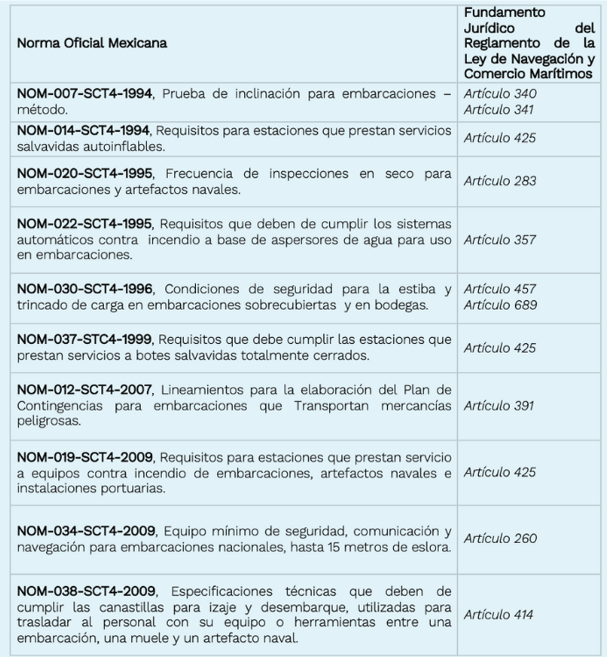
Operational Safety:
They aim to ensure the protection of human lives and property during maritime port activities. This includes requirements for safety equipment such as safety and rescue devices, communication systems, and other fire-fighting equipment.
Environmental Protection:
They help prevent and mitigate environmental impacts on marine and coastal ecosystems to ensure their preservation. This includes controlling the discharge of pollutants, the management of hazardous waste, and the control of oil pollution.
International Compliance:
Mexico is a member of several treaties related to navigation and marine environmental protection, such as the International Maritime Organization (IMO). The Official Mexican Standards (NOMs) ensure that the country meets its international commitments associated with navigation and international trade.
Certification and Competitiveness:
They allow vessels, ports, and
They allow operators to comply with regulations that improve efficiency and competitiveness in the maritime sector.
